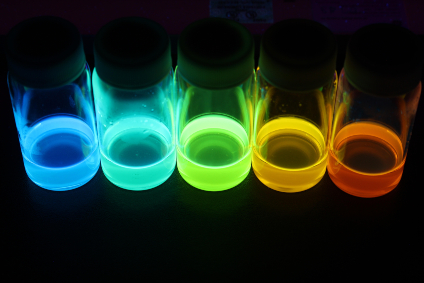Physicists at the University of Alberta have created a molecular colourant that can emit light in a wider range of colours than any other molecule currently available.
"This material could have many applications ranging from sensors to biological imaging and optical displays, among others," said former PhD student Stephen Lane, who conducted the research under the supervision of physics professor Al Meldrum.
"For instance, in biological imaging, a change of colour can be used to signal specific biochemical conditions or changes in real time."
The molecule, called P4VB, is versatile and easy to adjust to blue, green or red in the visible colour spectrum, depending on its chemical surroundings. In the study, the researchers note that it could offer a wider colour palette for applications including holographic projectors, vehicle headlights and even IMAX screens.
"It has high efficiency and can easily surpass the lasing threshold, implying that ultra-bright emission capability is possible," added Meldrum, who was a co-author on the study. "This means high potential for new applications in sensing and imaging."
"It's important to note that we are talking about light emission-that's different from many of the colours you see in the everyday world, which are based on reflection," he explained.
"And of course, there are still problems. Controlling the colour changes can be difficult, and photo bleaching is a problem in many cases. But we are excited about this promising technology."
The material was developed in collaboration with the Technical University of Munich.
The study, "Wide-Gamut Lasing From a Single Organic Chromophore," was published in the Nature journal Light: Science & Applications.
